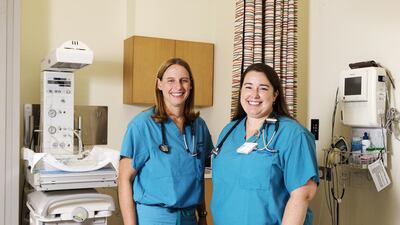AL AIN // A culture of pregnant women wanting unnecessary Caesarean sections is a waste of money and often a result of wrong information or pressure from doctors, according to experts at one of the country’s few not-for-profit hospitals.
With the cost of the procedure averaging Dh22,000 in private clinics, surgery does not come cheap, but with insurers picking up the tab once cases have been signed off by doctors, it has become big business.
The World Health Organisation recommends Caesarean rates of 19 to 21 per cent but the average figure in the UAE is closer to 36 per cent.
Oasis Hospital, in Al Ain, where 65 per cent of patients are Emirati, is bucking that trend with surgery rates of just 19 per cent last year.
Doctors at the hospital, founded by Christian missionaries, encourage all women to have a natural birth, where possible, as long as it is safe to do so.
Obstetrician Dr Brenda McLaughlin said many other private hospitals had a financial incentive to do more C-sections because there is better reimbursement from insurers.
“Logically, if you have a patient pushing you towards a C-section, it is easy to follow that as you get more money from the procedure, although it might not be the best thing for the patient,” she said. “The harder thing to do is explain the risks of C-section and benefits of a natural birth.”
Oasis Hospital has no shareholders or investors. Its chief executive, Alex Jankuloski, said practice guidelines were constantly changing to keep up with international standards.
“Our doctors have no financial incentives, so no financial motivation to do a C-section or any other procedure,” he said.
Caesarean births carry an extra risk of bleeding, infection and damage to the areas around the surgery, such as the uterus, bladder and bowels. Despite this, Dr Christel Brabon, head of obstetrics and gynaecology at the hospital, said it was becoming more common for women to ask for C-sections.
“Some mothers have done their research but the majority do not know the risks.”
At Latifa Hospital in Dubai, figures from 1992 show that, of 7,141 new mothers, 893 had a C-section – 12.5 per cent. Last year, 1,764 mothers, or 34 per cent, had the surgery. In Abu Dhabi, 33.5 per cent of all births were C-sections in 2014.
Lucy Rowney, assistant director of nursing and midwifery at Oasis, hosts classes to advise expectant mothers on the benefits of natural childbirth.
“Women are often scared of C-sections, because it is a major operation, and how it will affect them.”
Midwives are also encouraging more “natural C-sections”, where several minutes are taken to allow the baby to move slowly through the surgical incision.
After that there is skin-to-skin contact, early breast feeding and rooming together. It is less stressful for mother and child.
Such natural C-sections could soon be offered to all women in the UK, with a clinical trial to measure the benefits planned this summer.
More than 160,000 women have Caesareans a year in the UK, of which 13.2 per cent are elective.
“We are trying to head that way at Oasis, to offer a more natural-type C-section, where we delay cord cutting for the baby during a C-section,” Ms Rowney said.
nwebster@thenational.ae

